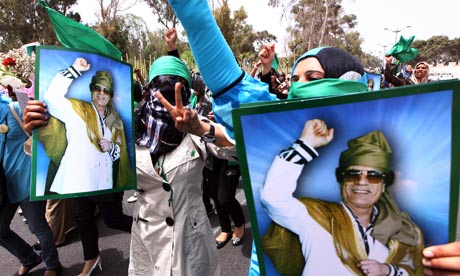
Libyans demonstrate last weekend in Tripli. Nato warplanes have carried out raids against the city's port and residence of Muammar Gaddafi. Photograph: AFP/Getty Images
Nato warplanes bombarded targets in Tripoli with more than 20 air strikes early on Tuesday, striking the area around Muammar Gaddafi's residential compound in what appeared to be the heaviest night of bombing of the Libyan capital since the western alliance launched its air campaign in March.
The rapid succession of strikes, all within less than half an hour, rattled windows and sent heavy, acrid-smelling plumes of smoke over the city, including from close to Gaddafi's Bab al-Aziziya compound.
Government spokesman Moussa Ibrahim said at least three people were killed and dozens wounded in Nato strikes that targeted what he described as buildings used by volunteer units of the Libyan army.
Nato said in a statement that a number of the attacks hit a vehicle storage facility adjacent to Bab al-Aziziya that has been used in supplying regime forces "conducting attacks on civilians".
It was not immediately clear if the facility was the only target hit in the barrage. Bab al-Aziziya, which includes a number of military facilities, has been pounded repeatedly by Nato.
The military aircraft flew low over the city during the night, the strikes coming in series of three loud booms punctuated by the hissing sound of low-flying jets
Pro-Gaddafi loyalists beeped their car horns and fired guns. Men screamed and shouted outside the hotel where journalists were staying, declaring their loyalty to Gaddafi.
Observers described the bombing as the heaviest attack on the Libyan capital since Nato began its air campaign on 19 March after the passage of a UN security council resolution to protect civilians after Gaddafi responded to the public uprising against his rule by unleashing his army and militias.
Nato, which said in its statement that it took care to "minimise the risk of collateral damage to the fullest extent possible", has been widening the scope of its strikes over the past weeks, increasing the pressure on Gaddafi, while the alliance's members have built closer ties with the rebel movement that has control of the eastern half of Libya. On Monday, the highest-ranking US diplomat in the Middle East, Jeffrey Feltman, was in the de facto rebel capital of Benghazi in a show of support.
Despite Nato bombing runs, the rebels have not been able to break Gaddafi's grip on the west of the country, including the capital, Tripoli.
The US state department statement said the visit by Feltman, assistant secretary of state for near eastern affairs, was "another signal of the US's support" for the rebels' national transitional council, which it called "a legitimate and credible interlocutor for the Libyan people".
Several countries, including France and Italy, have recognised the NTC, while the US, Britain and others have established a diplomatic presence in Benghazi.
0 comments:
Post a Comment